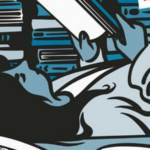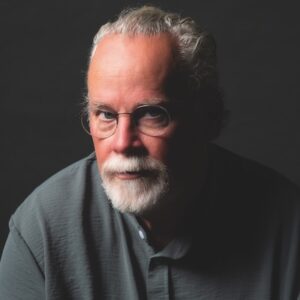Spy fiction is having a moment. According to Laura Martin at the BBC, that’s because of uncertain political times. In the past year alone, Black Doves topped the Netflix charts worldwide, an updated version of Frederick Forsyth’s The Day Of The Jackal was a TV hit for Sky/Peacock, Apple’s Slow Horses (based on Mick Herron’s Slough House series) returned for a fifth season, Stephen Soderbergh’s Black Bag was lauded by critics, and Nick Harkaway—son of John le Carré—kept alive his father’s legacy with the publication of Karla’s Choice.
Most of the fictional spies in these stories are brilliant, skilled and therefore cool. With the notable exception of Herron’s Jackson Lamb, who belches and farts his way to comedic incompetence. Nevertheless, all of them—even Lamb—are professionals. These are stories about professional spies and assassins clocking in for a good or bad day at the office.
But there’s a special place in my heart for the amateur. The guy or gal who was never trained and never expected to be getting into the spy business. Perhaps, even when up to their eyeballs in secret codes and fake identities, they’re still clueless as to what they’ve got themselves into. And that makes them relatable because, well, it could be me, or you.
How would I, a regular person, respond if I somehow got caught up in the world of espionage? How would you? The following reading list might offer some clues.
*

John Buchan, The Thirty-Nine Steps
Buchan’s hero is Richard Hannay, a British engineer recently returned to London from Southern Rhodesia. Hannay’s plans to live a quiet, ordinary life are quickly upended when a journalist neighbor shares with Hannay a plot he has discovered about an imminent political assassination.
Hannay takes in the neighbor for his own safety but, when the man winds up dead in his apartment, Hannay flees to Scotland armed only with the man’s notebook. A chase ensues across the British Isles as Hannay tries to work out who wants him dead. A cryptic clue in the notebook suggests a connection to the Thirty-Nine Steps, whatever or whoever they are.
Buchan’s brilliant, thrilling novel—adapted by Hitchcock in 1935—has often been credited as one of the forebears of the modern spy novel. It’s also a great example of a down-the-rabbit-hole plot in which a simple incident, seemingly insignificant or random in itself, plunges the protagonist instantly into an entirely new world.

Graham Greene, Our Man In Havana
Greene’s hilarious, absurd thriller follows James Wormold, a struggling British vacuum cleaner salesman in Cuba, who is recruited by MI6 to provide intelligence in exchange for cash he desperately needs. In order to keep the money flowing, Wormold begins to invent his intelligence, including by photographing vacuum cleaner parts and telling London they’re aerial photographs of secret military bases. When real life begins to imitate Wormold’s inventions, things begin to get very strange.
Alec Guinness gives a great turn as Wormold in Carol Reed’s 1959 movie adaptation.

John le Carré, The Tailor Of Panama
If not for James Wormold, we might never have met Harry Pendel, le Carré’s titular tailor. The Tailor Of Panama has essentially the same premise as Our Man In Havana and was widely regarded as an homage to Greene, although le Carré’s version is less absurd and more political. Pendel, a British tailor with a questionable backstory, is recruited by MI6 to provide intelligence on his wealthy and influential clients. Desperate to keep his handlers happy, Pendel begins to invent stories about Cuban politics, with terrible consequences.
Geoffrey Rush and Jamie Lee Curtis are terrific as the Pendels in John Boorman’s 2001 film version, plus you have to admire the casting of Pierce Brosnan—still the James Bond du jour—as the embassy handler.

Robert Littell, The Amateur
Despite the simplicity of the title, I’d say Littell’s novel falls into a sub-sub-genre you might call the semi-amateur. Charlie Heller is a cryptographer at the CIA. So, while he’s a technical nerd and certainly not cut out for the life of field operations, nevertheless he works for ‘the company’ and understands how it works.
When Charlie’s girlfriend is murdered in a terrorist attack on the U.S. consulate in Munich, he assumes the agency will immediately track down the perpetrators. When they don’t, Charlie decides to do it himself. Since he has none of the skills or aptitude of his operational colleagues, the fun of the novel is seeing how Charlie draws on his own technical expertise to complete the mission in different and unorthodox ways.
Two movie versions, both titled The Amateur, adapted Littell’s story in different ways. The 1981 version starring John Savage stays close to the novel, perhaps because Littell co-wrote the screenplay. According to IMDb, the screenplay was written before the novel. The 2025 version with Rami Malek moves the terrorist attack to London and is more concerned with hi-tech shenanigans than politics.

Susan Ouellette, The Wayward Spy
You’ll find some DNA from Littell’s The Amateur in Susan Ouellette’s Wayward trilogy, beginning with The Wayward Spy. Maggie Jenkins, like Charlie Heller, is a semi-amateur; she works as an analyst for the House Intelligence Committee. She’s also engaged to a CIA operations officer, so she knows how things work, but she’s definitely not cut out for the front line.
Until her fiance is killed in the bombing of a cafe in Tbilisi, Georgia. When the CIA fails to take action, Maggie goes off-piste, traveling to Georgia to hunt down the terrorist cell herself.
Quieter and more realistic than The Amateur, The Wayward Spy builds on Ouellette’s own experience as an intelligence analyst and it’s definitely worth checking out for those who prefer their spy fiction to be rooted in real-world tradecraft.

Chris Pavone, The Travelers
Will Rhodes is a travel writer and a recently-married New Yorker with financial troubles who jets around the world writing articles about hotels and wine for ‘Travelers’ magazine. After a tryst with an Australian woman in Argentina, he is surprised to be propositioned by the CIA. Like James Wormold and Harry Pendel, Rhodes needs the money, so agrees to provide information about the rich and powerful folks he meets on his travels.
But soon Rhodes begins to suspect that the CIA is actually interested in information about something else. If so, what? And then he begins to suspect that the CIA officers who recruited him might be imposters. If so, who are they? This one has more twists than a plate of rotini.
*
On the silver screen, Hitchcock’s classic North By Northwest (1959) is a great example of the amateur trope of the down-the-rabbit-hole variety. Cary Grant’s Roger Thornhill is a New York advertising exec innocently eating lunch at the Plaza Hotel when a pair of foreign spies mistake him for a government agent and kidnap him. Thornhill’s escape kicks off a madcap chase across the country reminiscent of a stateside take on The Thirty-Nine Steps.
On the small screen, look out for the forthcoming Peacock show Ponies from Susanna Fogel (Winner) and David Iserson (Mr. Robot). Set in 1977 Moscow, it stars Emilia Clark and Haley Lu Richardson as two PONIES (“persons of no interest”) who work as secretaries at the U.S. embassy. When their husbands are killed in mysterious circumstances, the two women set out to find the truth and uncover the Cold War conspiracy behind the tragedy.
*
My debut novel, Citizen Orlov (2023), set in an unnamed central European country between the two world wars, tells the story of Orlov, an unassuming fishmonger who is recruited by the Ministry of Security and stumbles upon a plot to assassinate the monarch. The style is absurdly dark comedy: think Our Man In Havana set in old Europe.
It also has a down-the-rabbit-hole plot; in the opening scene, Orlov innocently answers a telephone call meant for a government agent, and his life is never the same again.
The sequel, Hotel Melikov—published November 18th—begins with a bang as the kingdom descends into civil war. While still trying to mind his own business, Orlov is hired by both the government and the revolutionaries to spy on the other side, and so must navigate the stresses and complications of being a double agent.
Ultimately, Orlov finds that the outcome of the civil war is in his hands. That’s quite a pressurized role for a guy who just wants to sell fish in the market. But such is the allure of the amateur.
***


















